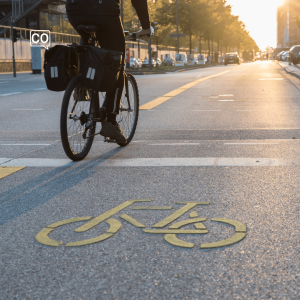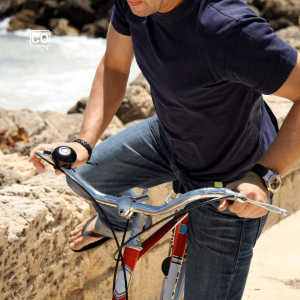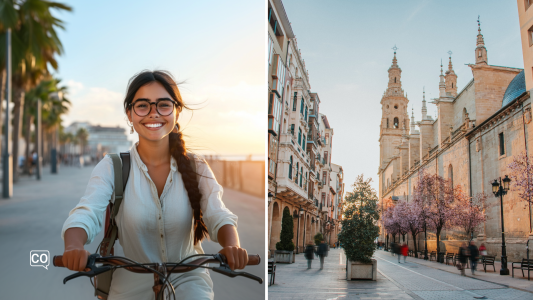Vocabulary (9) Share Copied!
Listening & reading materials
Follow adventures of Eva, Ana, Juan and Pedro.
A2.20.3 Cultura
Los carriles bici y las vías peatonales en España
The bike lanes and pedestrian areas in Spain
Grammar
It's not the most exciting thing, we admit, but it’s absolutely essential (and we promise it'll pay off)!
A2.20.4 Gramática
Dar consejos (Mi consejo es,...) + condicional simple
Giving advice (Mi consejo es,...) + condicional simple
Exercises Share Copied!
These exercises can be done together during conversation lessons or as homework.
Exercise 1: Reorder sentences
Instruction: Make correct sentences and translate.
Exercise 2: Translate and use in a sentence
Instruction: Pick a word, translated and use the word in a sentence or dialogue.
1
La zona verde
The green zone
2
Elegir
To choose
3
El transporte público
The public transport
4
Sostenible
Sustainable
5
Montar
To ride
Exercise 3: Verb conjugation
Instruction: Choose the correct form.
elegiríais, elegirías, elegirían, elegiríamos, elegiría
Exercise 4: Dar consejos (Mi consejo es,...) + condicional simple
Instruction: Fill in the correct word.
consejo, que tú, el consejo, lugar, Yo que
Additional learning materials Share Copied!
Appendix 1: Extended vocabulary table Share Copied!
Core vocabulary
(9):
Verbs: 2,
Adjectives: 2,
Interjection: 2,
Nouns: 3,
Context vocabulary:
4
| Spanish | English |
|---|---|
| Carriles bici | Cycle lanes |
| El carril bici | The cycle lane |
| El consejo | The advice |
| El transporte público | The public transport |
| Elegir | To choose |
| Elige | Chooses |
| La zona verde | The green zone |
| Montar | Cycle |
| Montar en bici | Cycling |
| Peatonales | Pedestrian |
| Preferido | Favourite |
| Sostenible | Sustainable |
| Zonas verdes | Green spaces |
Appendix 2: Verb conjugation tables for this lesson Share Copied!
Elegir to choose Share Copied!
Condicional simple
| Spanish | English |
|---|---|
| yo elegiría | I would choose |
| tú elegirías | You would choose |
| él/ella elegiría | he would choose |
| nosotros/nosotras elegiríamos | we would choose |
| vosotros/vosotras elegiríais | you would choose |
| ellos/ellas elegirían | they would choose |
Don't see progress when learning on your own? Study this material with a certified teacher!
Do you want to practice Spanish today? That is possible! Just contact one of our teachers today.






















